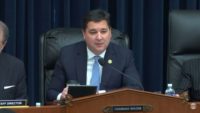Related Links:
Feds Push Eased Energy Permits, More Funding and 100K Miles of Transmission Upgrades
New Rules Will Limit Coal Power Plant Emissions, But Lawsuits Expected
The White House released a final rule April 30 to speed up National Environmental Policy Act reviews for major infrastructure projects and increase community engagement early enough in a project’s development to avoid unnecessary lawsuits.
The Biden administration, along with environmental groups, say the rule–released by the Council of Environmental Quality–will ensure that critical energy, broadband and other major infrastructure projects are built quickly and reduce adverse impacts on environmental justice communities.
"The rule helps ensure projects are built smart from the start by promoting early and meaningful engagement with communities, fostering community buy-in, reducing or avoiding conflict and improving project design," said a White House statement. It "helps ensure projects are on a strong legal footing incorporating longstanding case law and best practices for collaboration and coordination across agencies ... to deliver benefits to communities, workers, and project developers."
But business and industry groups, including construction trade associations, contend that the rule as written could lead to more litigation and delays rather than less. Some GOP and coal-state U.S. lawmakers have vowed to lead a resolution of disapproval vote under the Congressional Review Act to overturn the regulation, set to go into effect July 1. Thin margins for either party in Congress, however, will make it difficult for rule opponents to garner enough votes to override an almost-certain presidential veto—if the resolution could even pass both chambers.
Part Two of Two-Step Action
The Bipartisan Permitting Reform Implementation Rule is the second of a two-part Biden administration revamp of the landmark 1970 law that guides federal agencies to consider environmental impacts of proposed projects. The first, finalized in 2022, rolled back Trump-era changes that environmental groups say weighed NEPA reviews too heavily toward project proponents. The new rule incorporates changes required under the bipartisan Fiscal Responsibility Act signed into law last year and also requires agencies to consider climate change and environmental justice impacts when performing analyses.
Council Chair Brenda Mallory said in a statement that the changes “will deliver smarter decisions, quicker permitting and projects that are built better and faster.” New requirements will also protect communities from pollution and adverse environmental impacts that can be the result of “poor planning and decision-making,” she added, and ensure projects are sited in ways that will not disproportionately affect environmental justice communities.
The new requirements related to the fiscal responsibility law include designating lead agencies to coordinate federal reviews, reducing the total number of review pages and requiring them to be completed with shorter timeframes, typically two years for most projects.
Construction Industry Concerns
Construction groups say that the language of the new rule is vague enough that rather than reducing litigation, it could lead to more lawsuits. “I think there's a lot of factors where they’re either undefined or the definitions are vague, to the point where they open up the project proponent to litigation,” says Prianka Sharma, vice president and counsel for regulatory affairs the American Road and Transportation Builders Association. “The totality of all of these changes amounts to a lot of uncertainty.”
That uncertainty can lead to spikes in project costs as contractors factor the risk of potential NEPA-related delays into bids, Sharma adds.
Michael Altman, the Associated Builders and Contractors’ manager of federal regulatory affairs, says that while the final rule does incorporate changes by the fiscal responsibility law, it does so in a “toothless” way. While the rule places deadlines on project reviews, those can be extended indefinitely—opening projects to delays and increased vulnerability to lawsuits. The addition of climate and environmental justice will add further layers of risk and bureaucracy that could cause delays as well, he says.
Environmental and public health advocates disagree.
Sam Wojcicki, senior director of climate policy at the National Audubon Society, said in a statement that the changes will lead to both improved public health as well as better project outcomes with more community input.
“The new climate and environmental justice provisions will result in more robust, more resilient projects, while ensuring that the voices of the impacted communities are heard," he said. "Meaningful community engagement is critical for an equitable, sustainable and lasting clean energy transition.”






Post a comment to this article
Report Abusive Comment